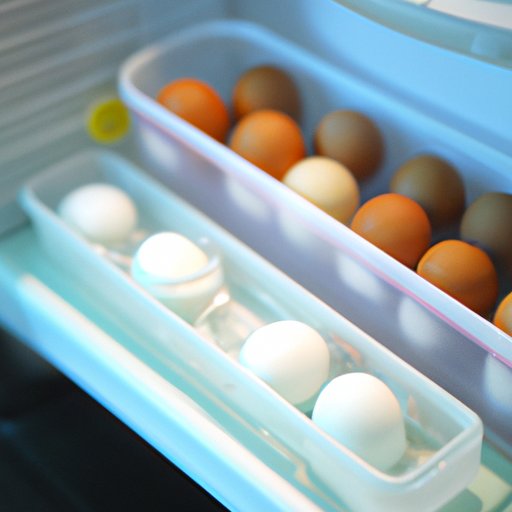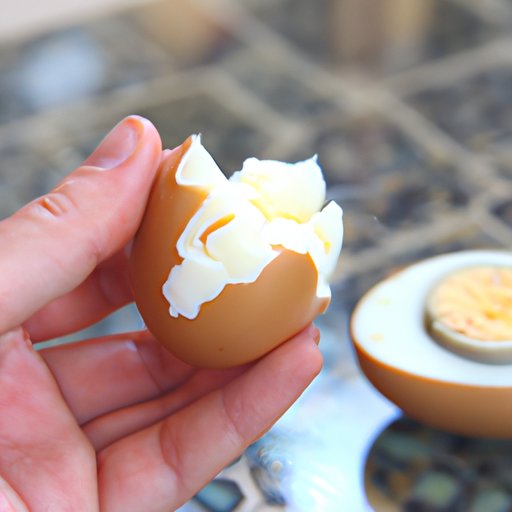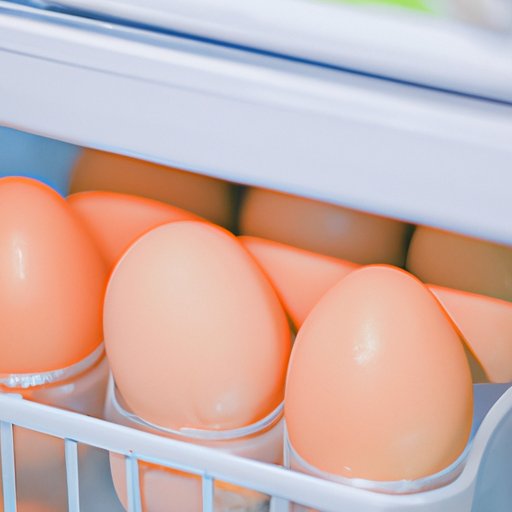Introduction
Hard boiled eggs are a staple in most households, whether they’re served up as part of a healthy breakfast or lunch, added to salads or sandwiches, or used as an ingredient in other dishes. But have you ever wondered just how long can hard boiled eggs last in the refrigerator? In this article, we’ll explore the shelf life of hard boiled eggs in the fridge and what factors affect their longevity.

Exploring the Shelf Life of Hard Boiled Eggs in the Refrigerator
When stored properly in the fridge, hard boiled eggs can last up to one week, but the exact timeline depends on several factors. To ensure that your hard boiled eggs remain safe to eat, it’s important to understand the potential risks associated with consuming them past their prime.
How Long Can Hard Boiled Eggs Last in the Fridge?
If kept in the refrigerator, hard boiled eggs should last for up to one week. According to the USDA, hard boiled eggs can be stored in the shell for up to one week if kept at a temperature of 40°F or lower. It’s important to note that the quality of the egg will decline over time, so it’s best to consume them within the first few days of refrigeration.
Factors that Impact the Longevity of Hard Boiled Eggs
The shelf life of hard boiled eggs is affected by several factors, including the temperature of the storage area, the amount of time the eggs have been stored, and the condition of the eggshells. The temperature of the storage area should be 40°F or lower, as higher temperatures can cause the eggs to spoil more quickly. Additionally, the length of time that the eggs have been stored in the refrigerator also impacts their shelf life; the longer the eggs are stored, the more likely they are to spoil. Finally, the condition of the eggshells can affect the longevity of the eggs; eggs with cracked shells are more likely to spoil because bacteria can enter through the cracks.
How to Maximize the Freshness and Longevity of Hard Boiled Eggs
To make sure that your hard boiled eggs remain fresh and safe to eat for as long as possible, there are a few steps you can take to maximize their shelf life. By following these best practices, you can enjoy your hard boiled eggs for up to one week after boiling them.
Best Practices for Storing Hard Boiled Eggs
The most important step in storing hard boiled eggs is to make sure that they are kept in a cool, dry place. Ideally, the eggs should be stored in the refrigerator, where the temperature is 40°F or lower. It’s also important to store the eggs in a sealed container to prevent any moisture from entering the container and causing the eggs to spoil.
Tips for Keeping Hard Boiled Eggs Fresher for Longer
In addition to storing the eggs in the refrigerator, there are a few other tips that can help keep your hard boiled eggs fresher for longer. First, remove the eggshells before storing the eggs to prevent any bacteria from entering through the shell. Second, add a teaspoon of baking soda to the storage container to help absorb any odors that may develop. Finally, change the water in the storage container every few days to prevent the eggs from becoming too soggy.

The Science Behind Keeping Hard Boiled Eggs Edible in the Fridge
It’s important to understand the science behind keeping hard boiled eggs safe to eat in order to maximize their shelf life. In order to keep hard boiled eggs fresh for up to one week, it’s important to maintain a specific temperature and humidity level in the refrigerator.
Understanding the Role of Temperature and Humidity
Temperature and humidity both play a role in keeping hard boiled eggs fresh. If the temperature of the storage area is too high, the eggs will spoil more quickly due to the growth of bacteria. The ideal temperature for storing hard boiled eggs is 40°F or lower. Additionally, the humidity level should be low, as a high humidity level can cause the eggs to become soggy and spoil more quickly.
Examining the Effects of Bacteria on Hard Boiled Eggs
Bacteria can also affect the shelf life of hard boiled eggs. Bacteria can enter the eggs through cracks in the eggshells, which can then cause the eggs to spoil more quickly. It’s important to inspect the eggshells before storing the eggs in the refrigerator to ensure that there are no cracks that could allow bacteria to enter.
When Should You Toss Those Hard Boiled Eggs Out?
It’s important to know when it’s time to throw away your hard boiled eggs in order to ensure that you don’t consume spoiled eggs. There are several signs that can indicate that your hard boiled eggs have gone bad, including changes in texture, smell, color, and shell.
Signs of Spoiled Hard Boiled Eggs
If your hard boiled eggs have a slimy or sticky texture, a strong sulfur-like smell, or a greenish-gray color on the yolk, they should be thrown away. Additionally, if the eggshells are cracked or broken, they should be discarded as well.
Knowing When It’s Time to Throw Away
If you’re unsure whether or not your hard boiled eggs are still good to eat, it’s best to err on the side of caution and discard them. Eating spoiled eggs can cause food poisoning, so it’s important to always check for signs of spoilage before consuming them.

How to Tell if Your Hard Boiled Egg is Still Good to Eat
If you’re unsure whether or not your hard boiled eggs are still good to eat, there are a few tests you can do to determine their freshness. Testing the texture, smell, color, and shell of the eggs can help you determine if they’re still safe to consume.
Testing the Texture and Smell
The first test you can do is to check the texture and smell of the eggs. If the eggs have a slimy or sticky texture, or a strong sulfur-like smell, they should be thrown away. If the eggs pass the texture and smell test, you can proceed to the next step.
Examining the Color and Shell
The next test is to examine the color and shell of the eggs. If the eggshells are cracked or broken, they should be discarded. Additionally, if the yolks have a greenish-gray color, they should also be thrown away. If the eggs pass both tests, they are still safe to consume.
Conclusion
Hard boiled eggs can be stored in the refrigerator for up to one week, as long as they are stored in a cool, dry place and the eggshells are intact. To maximize the shelf life of your hard boiled eggs, it’s important to follow best practices for storing them, such as removing the eggshells before storing and changing the water in the storage container every few days. If you’re unsure whether or not your hard boiled eggs are still good to eat, it’s best to discard them as eating spoiled eggs can cause food poisoning. By following these guidelines, you can enjoy your hard boiled eggs for up to one week after boiling them.


